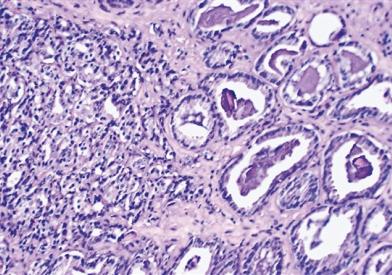What Is Prostate Cancer?
Prostate cancer is a disease in which cancer forms in the tissues of the prostate, a male gland just below the bladder and in front of the rectum. Prostate cancer is rare in men younger than 50 years of age, and the chance of developing prostate cancer increases as men get older. In the United States, a man has a one in five chance of being diagnosed with prostate cancer in his lifetime.

Signs and Symptoms
Symptoms may not appear during the early stages of prostate cancer, and most symptoms of prostate cancer vary from person to person. Having these symptoms does not mean you have prostate cancer.
Common prostate cancer signs and symptoms may include:
- Weak or interrupted ("stop-and-go") urine flow
- Sudden or frequent urge to urinate
- Trouble urinating or starting the flow of urine
- Trouble emptying the bladder completely
- Trouble holding back urination
- Pain or burning urination
- Blood in the urine or semen
- Pain in the back, hips, or pelvis that doesn't go away
- Shortness of breath, feeling very tired, an accelerated heartbeat, dizziness, or pale skin caused by anemia
- Difficulty having an erection
Some of the symptoms listed above may occur with a condition called benign prostatic hyperplasia (BPH). BPH occurs when the prostate enlarges and interferes with urine flow or sexual function. BPH is not cancer, but surgery may be needed to correct it. The symptoms of BPH or other problems in the prostate mimic the symptoms of prostate cancer.







